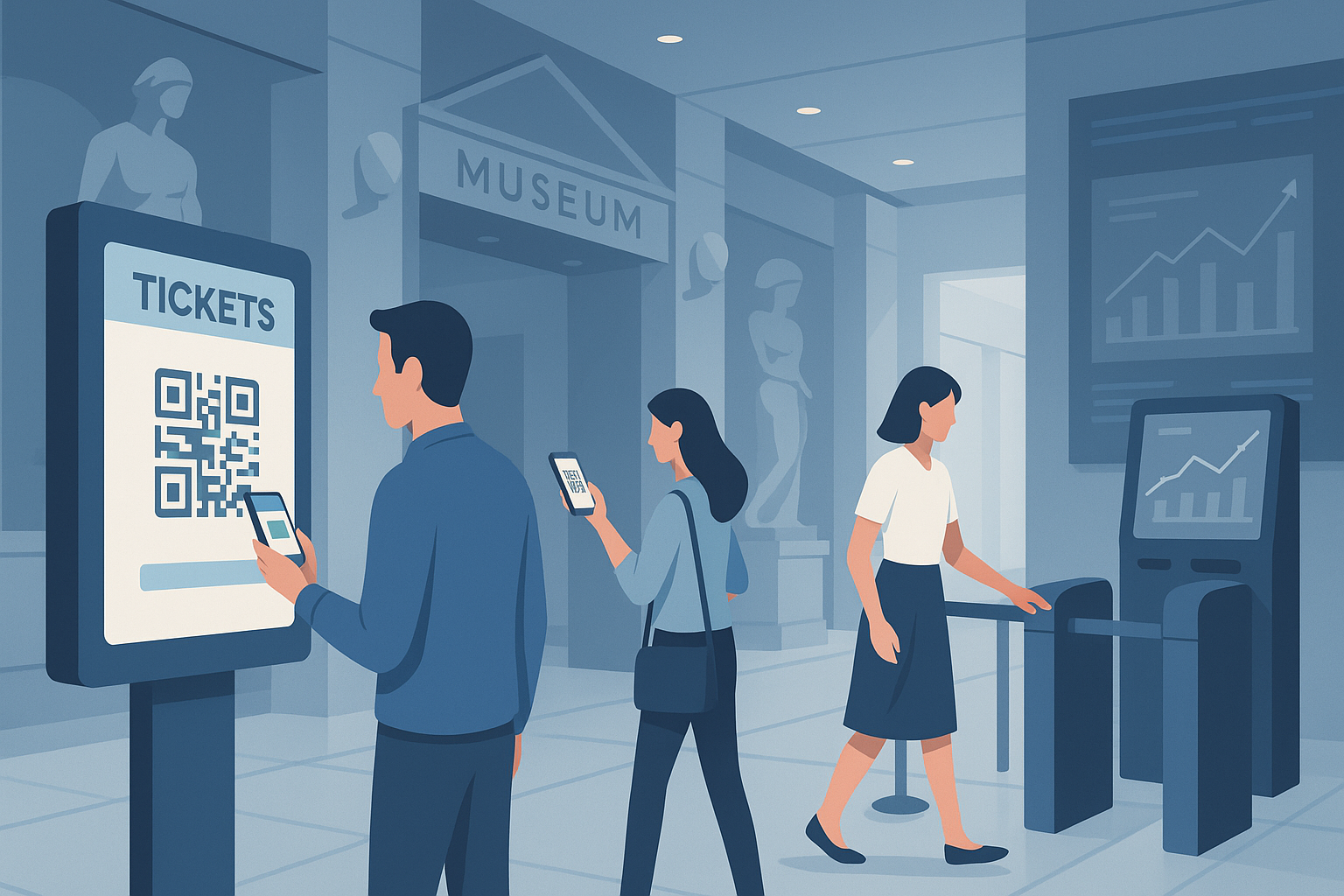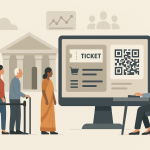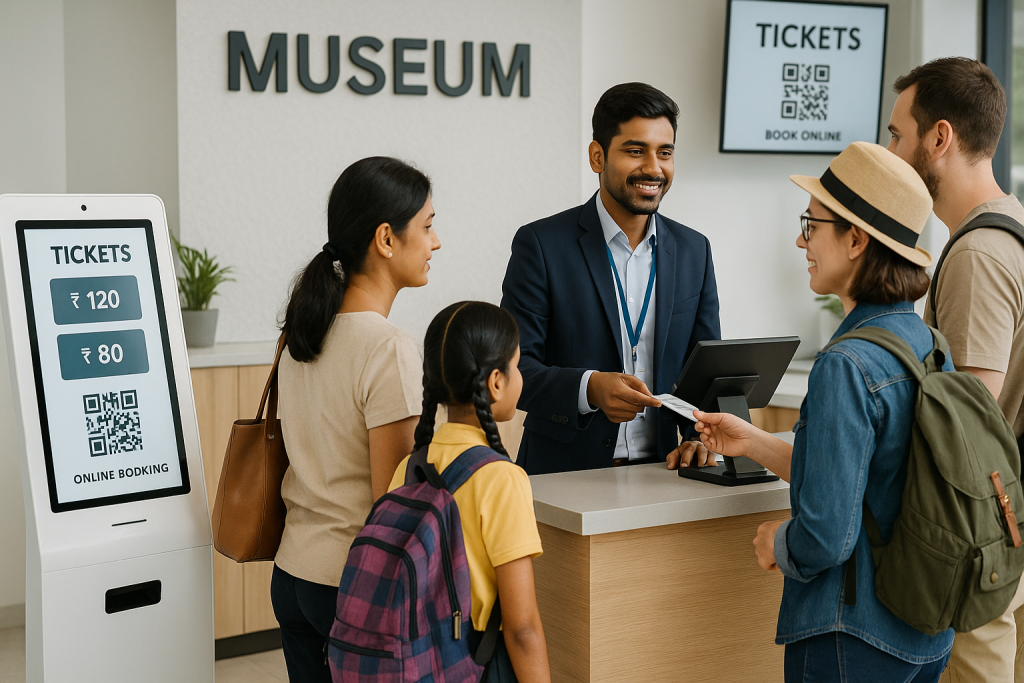A Museum Ticketing System is essential for running a museum today, as it’s not just about curating exhibits, it’s about managing rising operational costs, limited staff resources, and increasing visitor expectations. If you’re still relying on manual processes or outdated systems, chances are you’re spending more than you need to on daily operations.
The global digital ticketing market was valued at approximately $25.9 billion in 2023 and is projected to reach $53.7 billion by 2033, growing at a CAGR of 7.6%. The entertainment sector, which includes museums, is expected to grow at a CAGR of 6.7% from 2023 to 2033, driven by digital adoption and immersive experiences
This is where a modern museum ticketing system can make all the difference. It’s not just a tool to sell entry passes, it’s a smart solution that automates bookings, manages visitor flow, integrates with your POS and CRM, and helps you cut unnecessary expenses. In this guide, we’ll show you how the right digital ticketing platform can help you reduce operational costs and streamline the way your museum works.
What is a museum ticketing system used for?
A museum ticketing system is more than a digital version of your front desk, it’s a full-fledged operational tool designed to simplify and centralize ticket sales, visitor check-ins, and revenue tracking.
With a modern museum ticketing platform, you can offer online bookings, timed entries, group reservations, and even mobile passes, all from a single system. It streamlines how tickets are sold across web, mobile, and on-site kiosks, while giving you real-time visibility into visitor numbers and revenue performance.
Unlike outdated manual processes, today’s ticketing solutions for museums integrate with your CRM, POS, and access control systems. The result? A more connected, efficient, and cost-saving experience, both for you and your visitors.
How can a ticketing system lower operating expenses?
If you’re looking for ways to reduce operational costs in your museum, switching to a cost-effective museum ticketing system is a smart move. Traditional methods, manual entries, paper tickets, and siloed booking records, not only slow you down but also cost more in the long run.
An automated museum ticketing solution helps you eliminate inefficiencies and tighten control over daily operations. Here’s how it cuts costs immediately:
- Reduces manual entry & staff burden – Automation handles bookings, confirmations, and cancellations with minimal staff involvement.
- Avoids overbooking or underbooking – Real-time availability prevents scheduling conflicts and wasted resources.
- Cuts paper, print, and physical infrastructure costs – Digital passes replace costly physical materials and maintenance-heavy machines.
Less overhead, more visibility, that’s how modern ticketing helps you operate lean and smart.
Can automation help reduce museum staffing costs?
Absolutely, automation is one of the most practical ways to streamline museum operations and reduce reliance on manual labor. With the right automated museum ticketing system in place, you no longer need staff to handle every transaction or visitor query at the front desk.
An intelligent system manages entry validation using QR codes or digital passes, allowing guests to check in without staff intervention. It also supports advance bookings online, minimizing phone calls and manual scheduling.
Need to manage group or school reservations? The platform handles that too, with automated confirmation, time slot allocation, and digital invoicing. A smart museum advance booking system not only frees up your team’s time but also improves the visitor experience with smooth, predictable flows.
What other operations can be streamlined?
Beyond ticket sales, a smart museum ticketing system helps you optimize multiple backend operations, saving time, money, and manual effort.
You can connect your museum point of sale system with the ticketing platform to manage store purchases, cafe orders, or merchandise sales, all from one dashboard. This integration makes inventory tracking automatic and eliminates duplicate data entry.
Looking to improve engagement? CRM integrations allow you to capture visitor data, track preferences, and send personalized follow-ups, enhancing your overall museum visitor management strategy.
Need quicker decisions? Built-in analytics and daily report automation give you instant access to visitor counts, revenue breakdowns, and performance trends. These smart museum ticketing solutions give you operational clarity and help your team focus on delivering memorable experiences, not paperwork.
Are digital ticketing platforms more cost-effective?
Yes, switching to a digital ticketing platform is one of the most cost-effective upgrades you can make. With a cloud-based system, you’re no longer tied to expensive hardware or on-site servers that require constant updates and maintenance.
Modern digital ticketing for museums eliminates the need for physical tickets, printers, and scanners, cutting down supply costs and reducing your environmental footprint. It also helps prevent fraud through secure, verifiable e-tickets that can’t be easily duplicated.
By removing these operational headaches, you gain a leaner, more flexible setup. Whether you’re a small local gallery or a national institution, cost-saving museum software lets you focus resources where they matter most on preserving culture and delighting your visitors.
What kind of museums benefit the most from smart ticketing?
Whether you manage a small local museum or a large national institution, a smart ticketing system offers real advantages. If you’re a small museum with a lean team, automation helps reduce your reliance on front-desk staff. You can handle bookings, confirmations, and visitor check-ins with minimal human effort, freeing your time for curation, education, or fundraising. For larger museums, the value lies in scalability. Smart ticketing gives you full control over high visitor volumes, timed entries, and integrated POS, all while maintaining a seamless experience. Take this example: A regional history museum cut staff hours by 40% by switching to a cloud-based system that automated group bookings and ticket validation. The result? Lower operating expenses, better guest flow, and more time to focus on the exhibits.
Final Thoughts
Adopting a smart, cloud-first museum ticketing system is one of the fastest, most effective ways to reduce operating costs while improving visitor experience. From automating bookings to streamlining daily tasks, the right system helps you do more with less, so you can focus on what truly matters: curating culture and growing your museum.
Ready to transform your museum operations? EveryTicket offers a comprehensive ticketing solution designed specifically for museums and cultural institutions. Reduce costs, automate processes, and enhance visitor experiences with our cloud-based platform. Get started with EveryTicket today and see how easy museum management can be.



